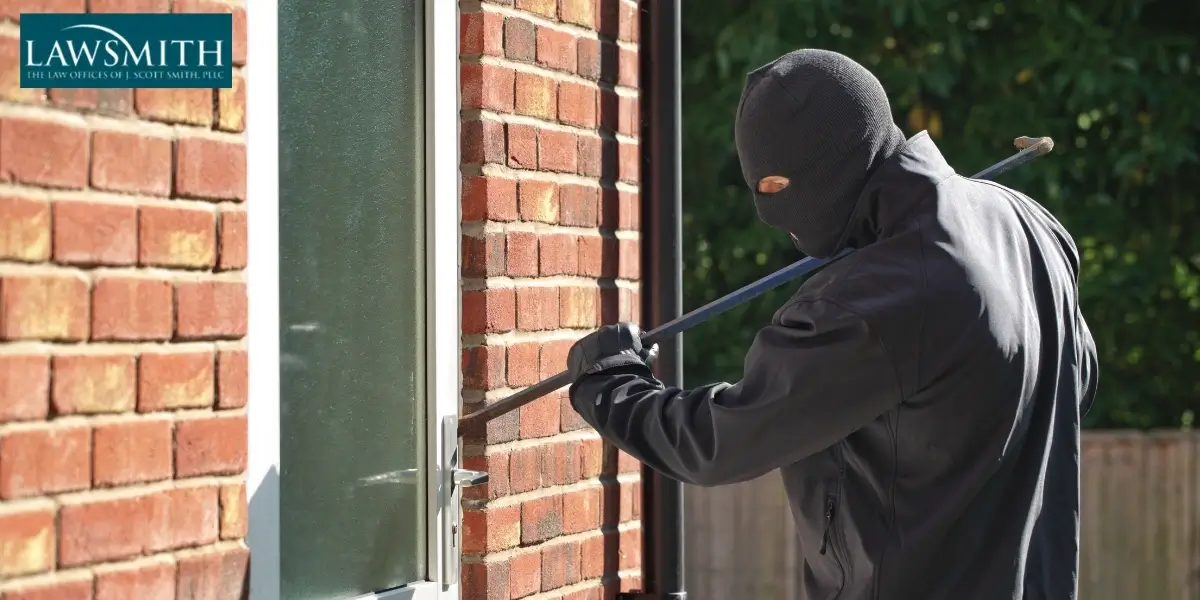Greensboro Burglary Lawyer
Greensboro Burglary Attorney

Burglary is not always a violent crime, but it is still considered a felony in North Carolina. Felonies incur the highest penalties of all crime types recognized by the state, including years of imprisonment and hefty fines. However, you do not have to let your felony charge go uncontested. A Greensboro burglary lawyer can review the circumstances of your case and help you obtain a sentence reduction or even a complete dismissal of your charges.
At LAWSMITH, The Law Offices of J. Scott Smith, PLLC, we understand that a criminal record can follow you throughout your life. Job opportunities, housing opportunities, and child custody , can all be negatively impacted by your criminal record. Having a strong defense in court can minimize the long-lasting effects of a felony charge and change the trajectory of your future for the better.
Even if you committed the crime you have been accused of, you can still benefit from the help of a burglary lawyer. We can help you get your sentence reduced and protect you from unnecessary penalties with our extensive knowledge of North Carolina court proceedings.
What Is Involved in a Burglary Charge in North Carolina?
Burglary is a specific kind of breaking and entering charge that involves homes, residences, and other dwellings being unlawfully entered. One requirement for burglaries is that they must occur at night, though it is considered a burglary whether or not an occupant is in the home.
For the prosecution to prove that burglary occurred, they must prove the following:
- The breaking and entering happened during the nighttime
- Whether or not occupants were within the dwelling
- That the breaking and entering occurred without the occupants’ consent
- There was intent to commit any felony or larceny
First-Degree vs. Second-Degree Burglary
There are two degrees of burglary recognized by North Carolina. First-degree burglary occurs when there are people occupying the dwelling at the time of the burglary, and it is considered a Class D felony. Second-degree burglary occurs when the dwelling was not actually occupied at the time. Second-degree burglary is considered a Class G felony.
Burglary is always charged as a felony in Greensboro, North Carolina. Felonies are the most severe kinds of crimes recognized by North Carolina, after infractions and misdemeanors. As such, they incur the highest penalties, and these penalties can be enhanced by other factors like assault and weapon usage.
Burglary and Theft Charges Are Often Intertwined
Burglary typically involves acts of larceny, although the requirement that it affects a dwelling during the nighttime sets it apart .
Penalties for Burglary in North Carolina
Penalties for burglary cases are dependent on the degree of burglary . People who commit first-degree burglary, which is a Class D felony, can be sentenced to between a little over 3 years 4 years of imprisonment to a maximum of 17 years. Penalties for second-degree burglary, a Class G felony, can range between 8 months and over 4 years of imprisonment.
How a Criminal Attorney Can Defend Against Your North Carolina Burglary Charge
At LAWSMITH, The Law Offices of J. Scott Smith, PLLC, we construct our defenses around the details of your case. After going over the facts with you, we can determine the strongest course of action to ensure your success. Some of the defenses we can use to minimize your penalties or advocate for your innocence are:
- That the occupant of the dwelling had consented to your entry
- That the burglary occurred by accident, and you did not have any felonious intent to commit the crime
- That the burglary was necessary and/or defensible for other reasons
FAQs
What Is the Charge of Burglary in North Carolina?
The charge of burglary in North Carolina is assigned to people who have committed a specific type of breaking and entering where they unlawfully and intentionally entered a dwelling at night with the intent to commit a felony therein. This is similar to, but not the same as, breaking and entering. Burglary can be classified into first- and second-degree burglary, which are Class D felonies and Glass G felonies respectively.
What Is the Statute of Limitations on Burglary in North Carolina?
There is no statute of limitations on burglaries in North Carolina. Unlike misdemeanors, felonies in North Carolina can be charged decades after the offense occurred. There is no deadline for filing a felony charge.
What Is the Most Serious Burglary Charge?
Between first- and second-degree burglary charges, first-degree charges are the most serious. This occurs when an occupant is in the dwelling at the time of the burglary, and it can involve other charges, such as assault against the occupant.
Is Burglary the Same as Breaking and Entering in North Carolina?
In North Carolina, burglary is a type of breaking and entering, but it is not exactly the same. Burglary typically involves houses, apartments, and other types of dwellings. Breaking and entering is not specific to dwellings and it includes business and other types of buildings. Second-degree burglary is not the same as breaking and entering, even if no one is present in the dwelling at the time of the incident.
Experienced Criminal Defense at LAWSMITH, The Law Offices of J. Scott Smith, PLLC
If you have been charged with a burglary in North Carolina, you deserve experienced, comprehensive legal counsel. Criminal charges can affect all aspects of your life and should be treated with the utmost care by a lawyer.
Contact us today to schedule a consultation with a Greensboro burglary lawyer at LAWSMITH, The Law Offices of J. Scott Smith, PLLC. Our method of individualized attention and personal communication has resulted in reduced sentences, dismissed charges, and satisfied clients in cities across North Carolina.

